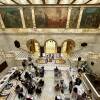An eight-alarm fire gutted a commercial building in Brighton last week. What started the fire is still unknown, but it devastated the businesses that made up the space: a dance studio, a music school and the popular recording studio Zippah Recording. Owner, producer and musician Brian Charles had collected much of his one-of-a-kind and vintage gear over the 30 years that he was in that space.
Charles joined host Henry Santoro on Morning Edition to discuss the history of his studio and impact of the fire. This transcript has been edited for clarity and length.
Henry Santoro: Any place where music is made tends to hold its history — you can feel the energy, you can feel it in the equipment, you can feel it in the walls. What was created there and performed there, breathed a life into the space. Did you feel that way about Zippah?
Brian Charles: Absolutely. The place felt alive when you walked in. You know, it was it was one of those places — I saw it happen so many times — where artists would walk in there and just be in the best creative place. There was something about the footprint of the studio being sort of tight, a little bit close together. If I had a band in there and it wasn't your turn to play on a track or something, you still knew what was going on. It was that charged environment where everybody was either actively involved or passively involved all the time. You know, you couldn't walk down the hallway and go hang out in some other room or some other lounge or something like that. We didn't have that. It was really a potent space where everybody was involved in that creative energy.
Santoro: Brian, what was it like getting that call last Friday morning?
Charles: The call came in to me around 5:30 in the morning from another tenant in the building, actually the wife of another tenant in the building. And then I learned seconds later the building's on fire. I was half asleep, and I wasn't sure if I was actually awake or if it was real. My wife woke up and said, "What?!" You know, she could hear it through the phone. We charged out of the house. ... I was wearing a jean jacket, she was in a vest, and it was like, we didn't think it through. We just went over there.
It was dark. It was filled with smoke. The street was filled with water. And it was a nightmare. It was a complete nightmare. I was just looking for the landlord, John Gately. We've become quite close over the years. He's 83 years old and he has an apartment in the building, so I wanted to make sure that he got out, and there was a custodian that also lived there and another tenant. I quickly found out that they were OK.
And then I just went into shock. I didn't really understand what was happening. And it wasn't until probably the next day that it set in that this is gone. I started to see the posts, and I started to see the community reach out. I realized I've never lost so much and gained so much at the same time. It's a weird feeling.
Santoro: Have you been to the building since that morning of the fire?
Charles: The city has been there. I'm trying to get back in the building because I would like to recover anything that I can. You know, it was deemed unsafe for entry, so there's a chance that nobody will be able to get back into that building.
Santoro: You had some irreplaceable items in in that studio. Can you tell us a couple of those items?
Charles: In the early 2000s when everybody was able to record themselves on their computers, I knew that if I wanted to keep doing it, I needed to find a way to offer something that you couldn't get at home. And so part of that was collecting rare and unusual gear. And the other part was the human element: really helping someone realize their vision, applying a specific aesthetic to what someone is trying to do, and just trying to steer them to their dream.
Part of that was obviously this crazy collection that I have amassed. We had a vintage Mellotron, which is the tape-based sampler the Beatles used for "Strawberry Fields," and we had a custom tape set in it — that I don't think any other Mellotron had — with bass, clarinets and cellos. Keeping that stuff working with was a full-time job. And you know, the list goes on and on. I could never recreate this collection of gear. It would be impossible.
Santoro: The Boston radio and music communities are very closely knit. As you know, many are not about to let you go through this alone. A GoFundMe has been set up in Zippah's name. What makes Boston a great place to own a studio in?
Charles: It's one of the last places that I can think of where you can record musicians playing instruments that's not in a country music scene. And so, you know, a lot of the music that's being made today, the singer might be the only human being on the track, and everything else is, you know, programed or, you know, done in the computer. It's just a testament to this town. This town is like no other. I mean, it's like no other place that I've ever been.








